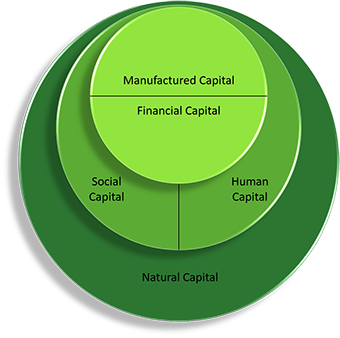Sustainable Development Goal 15.9

'By 2020, integrate ecosystems and biodiversity values into national and local planning, development processes and poverty reduction strategies, and accounts.'
What is Natural Capital?
Global, national and local economies depend highly on nature.
In spite of this, the value of nature remains invisible in decision-making, and the contribution of nature to human wellbeing and the economy remains insufficiently understood. Development metrics, such as the Gross Domestic Product (GDP) fail to include the environment.
The concept of Natural Capital was introduced by Schumacher in the 1970s to complement the current understanding of human wellbeing. Denoting nature as capital is an economic metaphor to acknowledge the value of nature for economic production and well-being.
To facilitate SDG 15, a transformation of the perception of growth and nature is required. National economic development targets need to be aligned with the goal of preserving land resources, which is increasingly being reflected in concepts like the ‘Green Economy’ aligning the economic prosperity with ecological boundaries. This perspective is reflected in the sustainable development sub-goal 15.9.
ELD Initiative’s contribution to SDG 15.9
ELD Initiative is well positioned to facilitate the mainstreaming of Natural Capital and its accounting into national decision-making. Besides providing information and insights into the relation between the environment and the economy, Natural Capital Accounts (NCA) can be utilised to monitor the progress towards reaching the vision encompassed in the Agenda 2030, especially with relation to Land Degradation Neutrality (SDG 15.3). Numerous countries have already started developing environmental accounting and realigning their economic development pathways by identifying new opportunities to integrate these values in the national planning and development strategies.
ELD Initiative has a strong network of experts and specialised knowledge about mainstreaming economic assessments of land-based natural capital and respective ecosystem services into decision-making. With this focus on land, ELD Initiative will strengthen the links between the SDG 15.3 and 15.9 by supporting countries in understanding the macro-economic benefits of sustainable land management. With the renowned ELD 6+1 approach to value ecosystem services, the ELD Initiative can provide valuable data to natural capital accounting, which reflect different management scenarios. This information then provides the critical foundation for subsequent national efforts to transform economies.
